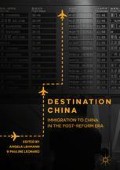Abstract
Rapid economic development has transformed China’s place in the global migration order. To respond to these changes, the Chinese Ministry of Public Security (MPS) drafted the country’s first comprehensive immigration law, which was passed in 2012. The new Exit and Entry Administration Law institutionalized long-standing practices of charging Chinese citizens with enforcing the nation’s outer borders. Penalties for housing and employing undocumented migrants were standardized, and people were required to “duly report” foreigners who illegally enter, reside, or work in China. The law’s inconsistent and vague nature leaves much to be specified through provincial regulations and interpreted by local law enforcement officers. The responsibility for implementing Chinese immigration legislation is largely placed at the subdistrict level, and relies on institutions and instruments that originally were designed to manage internal population movement. Among the most important of these is the residence registration requirement. While aspects of the aforementioned developments are specific to China, they also imply a double displacement of borders that can be observed in many parts of the world: border control is dispersed and shifted away from the nation’s outer edges, and the responsibility for monitoring the border is increasingly placed on non-state actors. The chapter identifies actors who—reluctantly, accidentally, or zealously—perform borders, as well as those who facilitate the circumvention of migration control in China. The performance of borders is examined from the perspective of African subjects of border control in Guangzhou, South China. The analysis is based on 16 months of ethnographic fieldwork, during which I was a registered foreign resident of a district in Guangzhou with a majority of African and Asian foreigners. Guangzhou hosts a large population of Africans who have come to China to study, trade, search for work, reunite with family, or a combination of such motives.
Access this chapter
Tax calculation will be finalised at checkout
Purchases are for personal use only
Notes
- 1.
The title of the report was 广州外籍流动人口管理现状分析与对策研究 (Guangzhou’s foreign migrant population: Analysis of management and counter measures).
References
Beine Michel, Boucher Anna, Burgoon Brian, et al. (2016) Comparing Immigration Policies: An Overview from the IMPALA Database. International Migration Review 50: 827–863.
Brady Anne-Marie. (2009) The Beijing Olympics as a Campaign of Mass Distraction. The China Quarterly: 1–24.
Butler Judith. (2006) Precarious Life: The Powers of Mourning and Violence, London: Verso.
Cheng Tiejun and Selden Mark. (1994) The origins and social consequences of China’s hukou system. The China Quarterly 139: 644–668.
Golub Stephen S. (2012) Entrepôt Trade and Smuggling in West Africa: Benin, Togo and Nigeria. The World Economy 35: 1139–1161.
Guangdong Government. (2011) 广东省外国人管理服务暂行规 (Temporary regulations for managing and servicing foreigners in Guangdong). Guangzhou: Guangdong Government Ordinance 155.
Guiraudon Virginie and Lahav Gallya. (2000) A Reappraisal of the State Sovereignty Debate The Case of Migration Control. Comparative political studies 33: 163–195.
Han Dong. (2010) Policing and racialization of rural migrant workers in Chinese cities. Ethnic and Racial Studies 33: 593–610.
Hand Keith J. (2006) Using law for a righteous purpose: The Sun Zhigang incident and evolving forms of citizen action in the People’s Republic of China. Columbia Journal of Transnational Law 45.
Haugen Heidi Østbø. (2012) Nigerians in China: A Second State of Immobility. International Migration 50: 65–80.
Liang Yucheng. (2013) 在广州的非洲裔移民行为的因果机制:累积因果视野下的移民行为研究(The causal mechanisms for African migration to Guangzhou: Research on immigration behavior in a cumulative causation perspective). 社会学研究 (Sociological research) 1: 134–159.
Liu Guofu. (2016) Chinese Immigration Law, London: Routledge.
Loong-Yu Au and Shan Nan. (2007) Chinese women migrants and the social apartheid. Development 50: 76–82.
Ministry of Public Security. (2012) Exit and Entry Administration Law of the People’s Republic of China. Adopted at the 27th meeting of the Standing Committee of the Eleventh National People’s Congress of the People’s Republic of China. Available at: http://www.mps.gov.cn/n16/n84147/n84196/3837042.html (accessed 30 January 2015).
National Bureau of Statistics of China. (2014) China Statistical Yearbook 2014, Beijing: China Statistics Press.
Pieke Frank. (2014) Emerging Markets and Migration Policy: China. Notte de l’Ifri. Paris: Center for Migrations and Citizenship.
Pieke Frank. (2012) Immigrant China. Modern China 38: 40–77.
Ping Qiu. (2014) 广州市副市长:说广州有几十万非洲人是误解 (The vice mayor of Guangzhou says hundreds of thousands of Africans is a misunderstanding). Southern Metropolis Daily. Guangzhou: The Nanfang Group.
QQ. (2014) Discussion forum. Available at: http://www.qq.com/coral/coralBeta2/coralMainDom2.0.htm (accessed 10.10.2014).
Wang Natalie. (2014) Guangzhou home to largest African expat population in Asia, many illegal. Available at: http://www.thenanfang.com/blog/guangzhou-home-to-largest-african-expat-population-in-asia-many-illegal/ (accessed 16.09.2014).
Zhang Qiang, Chen Yini, Yang Qin, et al. (2014) 中国广州社会形势分析与预测 (Analysis and forecast on social situation of Guangzhou in China (2014), Guangzhou: Social Science Academic Press.
Author information
Authors and Affiliations
Corresponding author
Editor information
Editors and Affiliations
Copyright information
© 2019 The Author(s)
About this chapter
Cite this chapter
Haugen, H.Ø. (2019). Residence Registration in China’s Immigration Control: Africans in Guangzhou. In: Lehmann, A., Leonard, P. (eds) Destination China. Palgrave Macmillan, New York. https://doi.org/10.1057/978-1-137-54433-9_3
Download citation
DOI: https://doi.org/10.1057/978-1-137-54433-9_3
Published:
Publisher Name: Palgrave Macmillan, New York
Print ISBN: 978-1-137-55710-0
Online ISBN: 978-1-137-54433-9
eBook Packages: Political Science and International StudiesPolitical Science and International Studies (R0)

